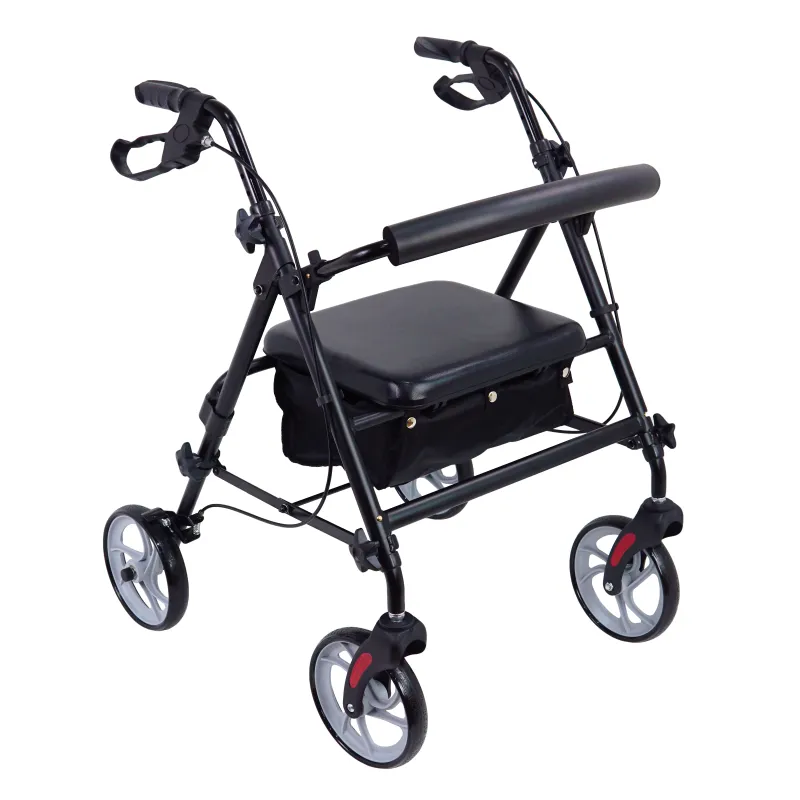
Which is Better Steel or Aluminum Rollator Walker?
2024-05-17 15:30
Rollator walkers are a very popular aid among people with limited mobility, however, many people may be hesitant when faced with the choice between steel and aluminum rollator walkers. This article will discuss the question "Which is better, steel rollator walker or aluminum rollator walker?", conduct an in-depth analysis of the characteristics and applicable scenarios of these two materials, and give selection suggestions based on user needs. At the same time, we will also explore related issues and learn more about the various rollator walker options.
Which is better steel or aluminum rollator walker?
First of all, the biggest advantage of the steel rollator walker is its durability. Steel is a very strong material and is able to withstand greater weight. This makes the steel rollator walker the best choice for users weighing over 250 pounds as it provides greater stability and safety.
Secondly, the advantage of the aluminum rollator walker is its lightness. Aluminum is a lightweight material, making aluminum rollator walkers easier to carry and operate. For those who need to move or carry the rollator walker frequently, the lightness of the aluminum rollator walker is undoubtedly a big advantage.
Each of these two rollator walkers has its own unique advantages and applicable scenarios. When deciding which one to choose, it's important to consider the user's needs and weight. If the user needs to bear more weight, then the steel rollator walker is a better choice. If users need a lightweight rollator walker for daily mobility, then the aluminum rollator walker will be more suitable for them.

How to choose rolling walker according to your needs?
There are many factors to consider when choosing a suitable rolling walker, such as: weight and load-bearing requirements, usage environment requirements, folding and storage requirements, wheel size requirements, accessories and functional requirements. Consider these requirements to ensure you choose a rollator walker that meets your personal needs and lifestyle.
Considerations and suggestions for choosing rolling walker:
1. Weight and load-bearing requirements: Choose based on your weight and the rolling walker’s load-bearing capacity. If you weigh a lot, you may want to choose a rollator walker with a higher load-bearing capacity, such as a steel rollator walker.
2. Usage environment: Consider where you will use the rollator walker. If you'll be using it primarily indoors, a lightweight aluminum rolling walker may be more suitable. If you frequently walk outdoors or on uneven terrain, you may want a sturdier rolling walker.
3. Folding and storage: If you need to carry or store the rollator walker frequently, choose a model that can be folded for easy portability and storage.
4. Wheel size: Larger wheels generally handle uneven terrain better, especially when doing outdoor activities. This needs to be chosen based on your usage scenario.
5. Accessories and functions: Choose a rollator walker equipped with seats, storage baskets and other functions according to your needs. These features can increase the usefulness of rolling walker.
By carefully considering these factors, you can choose the best rollator walker for you to meet the needs of your daily life.
What should we pay attention to when maintaining and maintaining the rollator walker?
The maintenance and upkeep of your rolling walker is critical to ensuring its long-term performance and safety. Maintenance and maintenance mainly include: regular inspection of various components, regular cleaning and disinfection of the rollator walker, wheel maintenance, brake inspection and appropriate storage environment.
Precautions for rollator walker maintenance and care:
1. Regular inspection: Regularly inspect all parts of the rollator walker, including wheels, brakes, seats and handles. Make sure these parts are not damaged or loose to ensure safe use.
2. Cleaning and Disinfection: Clean the rollator walker regularly, especially in frequently touched areas such as seats and handles. Clean with mild soap and water and disinfect appropriately.
3. Wheel maintenance: Check the wear of the wheels, especially if you frequently use your rollator walker outdoors. If the wheels are severely worn, replace them in time.
4. Brake inspection: Make sure the brake system of the rollator walker is working properly. If the brakes are loose or malfunctioning, please adjust or repair them in time.
5. Storage environment: Store the rolling walker in a dry, well-ventilated place to prevent moisture and corrosion.
By regularly maintaining and servicing your rollator walker, you can ensure its long-term stable performance and safety. This not only helps extend the life of the rollator walker, but also improves your experience.

Summarize
When choosing a steel or aluminum rollator walker, it is crucial to consider the user's needs and weight. Steel rollator walkers are suitable for users who require higher load-bearing capacity, while aluminum rollator walkers are lighter and suitable for people who need to move frequently. By carefully considering their needs and usage scenarios, and regularly maintaining and maintaining the rollator walker, users can ensure that the selected rollator walker provides stability and convenience in daily life.








